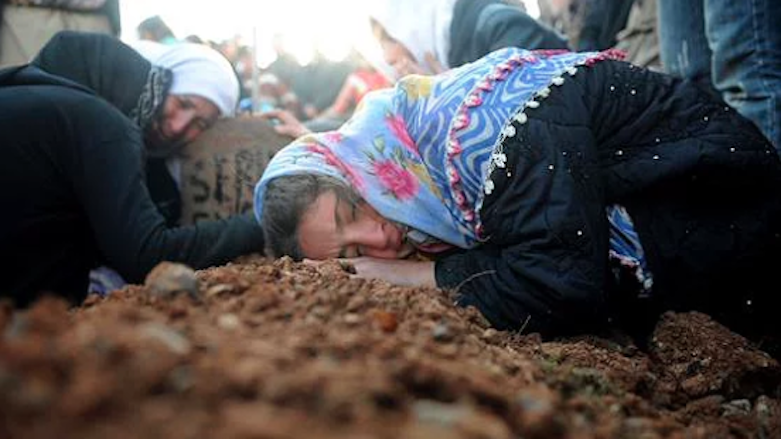In letter from Turkey prison, Kurdish leader commemorates Roboski massacre
On December 28, 2011, Turkish air force bombed a group of 40 civilians, killing 34 of them, who were smuggling goods on mules from the Kurdistan Region to the northern side of the border.

ERBIL, Kurdistan Region (Kurdistan 24) - Imprisoned co-leader of Turkey's pro-Kurdish party Selahattin Demirtas on Wednesday commemorated the 34 civilian victims of a massacre committed by Turkish warplanes six years ago in Sirnak province on the border with Kurdistan Region.
In a letter released by his Peoples' Democratic Party (HDP), Demirtas said the only crime of the victims, 17 of them teenagers, was to trade between two parts of their homeland divided by Turkish-Iraqi borderline.
In the later hours of December 28, 2011, Turkish air force bombed a group of 40 people, all civilians, who were smuggling goods, including diesel and cigarettes on mules from the Kurdistan Region to their villages of Roboski and Becuh on the northern side of the border cutting across a mountainous, snow-clad terrain.
Demirtas's message was read out to an audience, among them relatives of the victims, during an HDP commemoration in Istanbul for the sixth anniversary of the massacre, the party's website said.
"I looked at the bodies of the murdered children, wrapped in blankets and smelling of motor oil at the hospital corridors and rooms. In one of the rooms, I stayed alone with them for several minutes. I could almost hear the kids speaking to me," Demirtas said, remembering his visit to Sirnak's Uludere district the morning of the day after the air assault.

"They killed us, they told me. And you are late. We were poor. And our sole crime was trying to make a living by crossing a border that divides our homeland. Our country is shattered, and so are we, they said," the letter by the HDP leader read.
Ankara government has maintained its line that army officials who gave the order to strike mistook civilian smugglers for Kurdistan Workers' Party (PKK) fighters.
Demirtas said he then vowed to take those responsible in front of justice, adding the reason he was in prison for 13 months now was his commitment to that promise by not kowtowing to the administration of President Recep Tayyip Erdogan.
Erdogan, then the Prime Minister, and his government have never apologized to the families of the Roboski victims or held any military or civilian officials accountable for the massacre.
All the judicial and parliamentary investigations into the incident have so far failed in resulting the prosecution and conviction of anyone responsible.
Meanwhile, on Wednesday the Ankara-appointed governor of Sirnak put a ban on planned public commemorations in the village of Roboski on the sixth anniversary of the killings, citing the country-wide state of emergency law.
Relatives of the victims were warned that this year only one person from each family could visit the village cemetery where their loved ones were buried, whereas kids studying at the local primary school were informed that they could not miss any classes on Thursday.
However, upon pressure from the public, the governorate later withdrew the ban, Veli Encu said on Twitter, an activist from Roboski and relative of several of the victims from the same family.
Representatives of HDP, main opposition Republican People's Party (CHP), human rights organizations and NGOs have announced their participation in Thursday's memorial in Roboski, despite heightened militarization in the area.
Editing by Sam A.